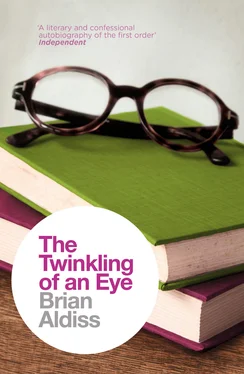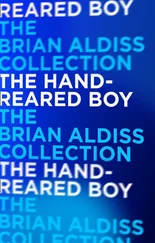Ah, the music of the big roundabout! The wheezing lungs of the boiler blow breath through unfolding punched paper, creating a din as powerful as the music. They play ‘Destiny’, ‘The Sun Has Got Its Hat On’, ‘You Can’t Stop Me from Dreaming’, ‘The Skater’s Waltz’, ‘Alexander’s Ragtime Band’, and many more tunes.
At night I am put to bed. Dot kisses me goodnight. The fair is still going. It’s getting rough, now that dusk closes in. Drunks are about. Who knows what’s happening as crowds are drawn to the excitement from distant Toftwood, Shipdham and Swanton Morley – chaps with girls and whatever they do together. As I fade away into sleep I hear its music in the distance: ‘You Are My Lucky Star’, interpreted through that randy, wheezing music.
When I am older, I have a small sister to take to the fair. She loves it as much as I do.
The fair people come into the Aldiss shop, often dragging their curs with them at the end of a piece of rope. The men buy new suits, spending generously in heaps of small coin. By the time the fair is over, its stalls folded away, its glitter packed and gone, the rubbish and droppings swept from the market square and Church Street, the town is fairly hopping with fleas.
Dot stands my sister and me in the bath. She pulls off our clothes. She searches every inch of us for fleas and squashes them with a thumbnail, one by one.
My father told me … that mine was the middle State, or what might be called the upper Station of Low Life , which he had found by long Experience was the best State in the World, the most suited to human Happiness.
Daniel Defoe
Robinson Crusoe
The film continues, in that eternal present of memory.
Dot at this period of her life is a moody person. She is in her early thirties when I am born. She has yet to recover from the death of her daughter in 1920, confronting her naughty son with the perfections of the dead girl, with the result that this phantom little person preys heavily on his state of mind. Studying an illustrated edition of Bunyan’s Pilgrim’s Progress – a copy of which no serious household was without – I see a picture of a man pestered by a small angel fluttering round his shoulders: there is absurdity and menace in it. From then on, the dead sister becomes ‘the steel-engraving angel’.
Dot has other problems. Bill’s health is one; his difficulties stem from the war.
He enlists in the Army on the outbreak of war in 1914, aged twenty-four. In May of 1916, he is transferred to the Royal Flying Corps (later to become the RAF). His number is 26047.
One period of the war he tells me about is the nightmare of a Channel crossing in a ship transporting mules to France, presumably to the British Expeditionary Force. A storm hits, the mules break loose below decks. Bill has to control them. I picture lamps swinging and blinking, hardly illuminating the dark fetid stables. Great black animals plunge in fright, showing the whites of their eyes. Amid the noise, the stamping hooves, Bill fights to keep the brutes steady.
Bill serves in Salonika. Later, he is gassed. He is sent to Egypt to recover. The dry air is considered good for his lungs. He is admitted to the 19th General Hospital in Alexandria, where he suffers from malaria. He flies with 113 Squadron in Mesopotamia.
Faded sepia photographs, kept in an old cardboard box, tell part of his story. Here he is in Luxor, among the ruins. Here he is by the Nile. Here he is in a topee, washing his socks. In most of these photographs he is perky and cheerful, as I first remember Bill – and puffing away at cigarettes. A photograph survives of him standing by an old Sopwith Something, leather flying helmet and goggles on his head, the image of Biggles, smoking.
He is involved in the Dardanelles débâcle, Gallipoli. But I cannot put a timetable together. Eventually, at the end of April 1919, he is discharged from what has become the RAF.
When approached in 1990 for details of Bill’s military career, the Ministry of Defence is helpful, but can, after so many years, produce only two brief documents. One of these documents shows that Bill is mentioned in despatches and awarded a pension of eight shillings and sixpence for seventy weeks. Presumably this is a disability pension.
Some time during the Second World War, when we live over the shop in Bickington, I discover a key which fits an old desk. Daringly, Betty and I unlock. In one drawer, to our mutual embarrassment, we discover a collection of washable condoms. In another drawer we find a document, written in Bill’s neat hand. It is an account in verse of his military career. Since he is something of an artist, he has illustrated it with sketches in pencil. We hear someone coming. Guiltily, we close the drawer.
What happened to this manuscript is a matter of guesswork. Sadly, it was not preserved.
Legend has it that when Bill’s ship bringing him back from the East docked in Southampton waters, he was so eager to get home that he dived overboard and swam ashore. He married Elizabeth May Wilson almost as soon as he had dried off.
Theirs is a modest wedding in Peterborough, with my uncle Bert as best man. It seems that even his father, H. H., on whom he so depended, was not present. Gordon, by contrast, marries in style in London.
Bill’s ill health continues. He is prevailed upon to lunch with Mother and me at a small table in their bedroom, at which, on doctor’s instructions, he drinks a bottle of Tolly’s Brown Ale every day. On the label of the bottle is a figure holding a torch aloft; perhaps it is Mercury. The novelty of this arrangement is appealing. On a Monday, it is generally mince, with triangular slices of toast.
A severe winter comes. Is this 1928? It snows at Christmas. Uncle Bert is staying with us. Bill is well enough to venture out for a walk. I am wrapped up like a small parcel. We walk into Dereham market place. All is silent under its white cover; there is no traffic. The horse trough by the war memorial is filled with a solid chunk of ice. But this is not a real memory. This is a photographed event. The film of the past has been edited.
What is real is the crunch of impacting snow under red rubber boots, the taste of air like a chilled wine, the wonderful sense of the world transformed. The knowledge that everything is miraculous can never again visit us as vividly as when we are three, and it is Christmas Day, and we are wrapped up like a small present.
But Bill coughs. It’s the gassing or the smoking, or probably both. I am frightened in the mornings by the terrible harsh noises he makes as he gets up and washes.
Poor Bill becomes unwell. In 1929, Dr Duygan says to him, ‘Stanley, if you want to survive the winter, you’d better go to a warmer climate.’
He books a passage on a liner and sails to South Africa for six months – rather a long winter.
Mother stands by the chest of drawers in their bedroom and weeps. I go to her and clutch her legs, the only part of her I can reach.
‘Don’t cry. I’ll look after you.’
It proves to be the sort of thing I am to say to women ever afterwards. Dot merely weeps harder.
She closes the flat. She takes me to stay with her mother in Peterborough. Uncle Bert is fun. Lions and tigers is our favourite game.
This is an exciting time in Peterborough. Dot’s brother Allen is getting married – rather late in life. He is to marry Nancy Perkins. I am to be their page. This responsible post is marred only by the fact that you have to wear shiny patent leather shoes with buttons .
After the ceremony, we all adjourn to Woodcock’s Restaurant, opposite the cathedral, for a wedding feast. This includes champagne. Considering that all the Wilsons are teetotal, this must represent a Perkins innovation.
Читать дальше












